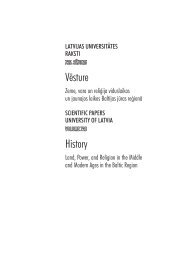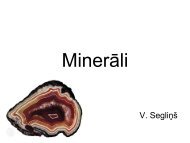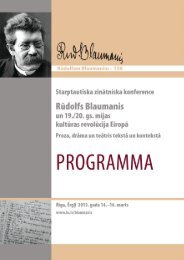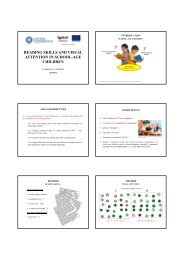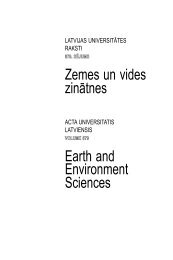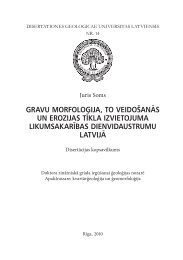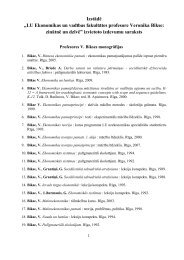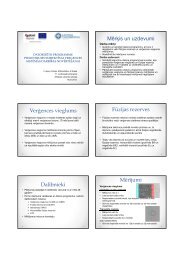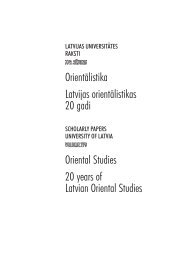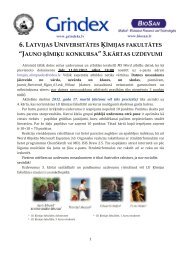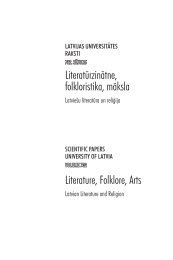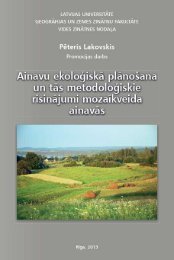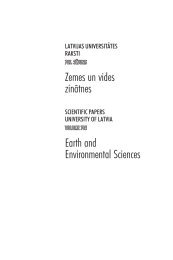Latgalistikys kongresu materiali, III. 2011. - Latvijas Universitāte
Latgalistikys kongresu materiali, III. 2011. - Latvijas Universitāte
Latgalistikys kongresu materiali, III. 2011. - Latvijas Universitāte
Create successful ePaper yourself
Turn your PDF publications into a flip-book with our unique Google optimized e-Paper software.
about which the author chose a much more neutral version, that is to say:<br />
‘Who has a squint...’. In the same passage, two terms can be picked on<br />
which, in Walloon, have relatively many meanings. The first one, clatcheû,<br />
means both ‘braggart, boaster’, but also ‘inveterate liar, storyteller’. The<br />
second one, man´dây, designates an odd-job man, an unskilled apprentice,<br />
but also an incompetent and a person who is no good at anything. The<br />
author has chosen ‘boaster’ and ‘dirty pig’, two perfectly correct translations<br />
that nevertheless do not render neither the first nor the derived<br />
meanings of such words which, in Walloon, have moreover a very strong<br />
emotive power.<br />
This is obviously by no means exceptional and it can be found in any<br />
form of literary translation.<br />
5. The treated themes<br />
We have already explained that the main theme of the whole anthology<br />
is the “Warum Krieg?”, the ‘Why war?’ that underlies the whole.<br />
The author’s captivity in a Stalag is only referred to in the anthology<br />
through a few allusions to food or clothes; such allusions enable him each<br />
time to evoke his family or his country, and they are sometimes pleasant.<br />
The recalling of a happy past that it seems the author wants to remember<br />
appears to be more important than the vicissitudes of the present.<br />
This is certainly an attitude which allowed the prisoner to endure better the<br />
said vicissitudes. The following three examples bear witness to this.<br />
Dji vike pus´ du solia qui d’ôte chôse / Mins dji don’reu sins babyî /<br />
Mi plène samwène di pwin gris, / Di sôcisson, d’ maquéye, di marmèlâde, /<br />
Di Knackelbrot sètch come du strin / Pou ène après din.nér dins l’ bos d’<br />
Tchèss’lèt, / Avou m’n-èfant èyèt m’ feume / Minme s’i ploût.<br />
‘I’m living more on sun than on something else / But I would give<br />
readily / My whole weekly ration of stale bread, / Of sausage, of fromage<br />
blanc, of jam, / of Knackelbrot as dry as hay / To spend an afternoon in the<br />
Châtelet wood, / In company with my child and my wife / Even if it is<br />
raining.’ (“Dji don’reu” ‘I would give’, p. 16)<br />
Avou m’ capote di Polonès, / M’ djaquète di Tchèque, mi culote di<br />
Francès, / Dji n’ sâré pus qwè dîre adon.<br />
‘With my Pole’s greatcoat, / My Czech’s jacket, my Frenchman’s<br />
trousers, / I shall not be able then to say anything.’<br />
(“Toudis pus tôrd” ‘Always later’, p. 24)<br />
Pa d’zeûs l’ ronde tâbe dèl grande cûjène, / Pou l’ dîsième côp dispûs l’<br />
matin, / Gaston asprouve ène rèyussite, / Camile, wèspiyant, s’abîye come<br />
èn-èsquimô, / Pour li ralér an Bèljique.<br />
37



